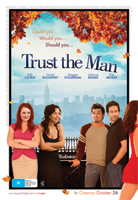Domhnall Gleeson and Maggie Gyllenhaal Frank
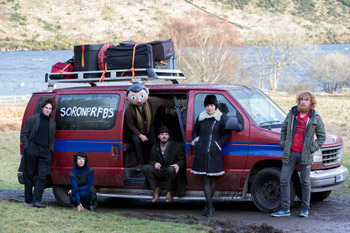
Domhnall Gleeson and Maggie Gyllenhaal Frank
Cast: Domhnall Gleeson, Maggie Gyllenhaal, Scoot McNairy and Michael Fassbender
Director: Lenny Abrahamson
Genre: Comedy, Drama, Mystery
Running Time: 95 minutes
Synopsis: Acclaimed Irish director Lenny Abrahamson follows up his award winning films Adam& Paul, Garage, and What Richard Did with an offbeat comedy about a young wannabe musician, Jon (Domhnall Gleeson), who finds himself out of his depth when he joins an avant-garde pop band led by the mysterious and enigmatic Frank (Michael Fassbender), a musical genius who hides himself inside a large fake head, and his terrifying bandmate Clara (Maggie Gyllenhaal).
Written by Jon Ronson (The Men Who Stare At Goats) and Peter Straughan (Tinker Tailor Soldier Spy, The Men Who Stare At Goats), Frank is based on the memoir by Jon Ronson. It is a fictional story loosely inspired by Frank Sidebottom, the persona of cult musician and comedy legend Chris Sievey, as well as other outsider musicians like Daniel Johnston and Captain Beefheart.
In the world of alternative music, The Soronprfbs are the ne plus ultra of outsiders. A brilliant, ramshackle, barely functioning band, they are built around the eponymous Frank (Michael Fassbender), an unstable yet charismatic musical savant, who at all times wears a large, round fake head with crudely painted-on features - like Daniel Johnston hidden behind a cartoon smile. His closest musical collaborator is the forbidding Clara (Maggie Gyllenhaal); part caretaker, part jailer, Clara is the antithesis of all things mainstream. The band is completed by Nana (Carla Azar), a Moe Tucker-like drummer, and Baraque (Francois Civil), a beautiful Frenchman who plays bass.
Into this mix comes replacement keyboard player, Jon (Domhnall Gleeson), after the band's original keyboardist is hospitalised following an attempt at drowning himself. In his head, Jon's is a true creative, a maverick musical force; in reality he's a very ordinary young man trying to escape his hum-drum, small-town life. For Jon, this is the break he's been waiting for, his chance to climb through the looking glass and into the world of artistic collaboration, real music-making, and rock 'n' roll adventure that he's always dreamed of. But he discovers (and perhaps has always suspected) that he lacks the one thing he needs to make his dream come true – genuine talent.
Desperate to belong, but hopelessly out of his depth, Jon becomes more and more infatuated with the enigmatic and talented Frank: if only he could understand him, what makes him tick, how he goes to those furthest, creative corners; if only he could -get inside that head inside that head'.
From a lakeside cabin, where the band spend 18 months - and all of Jon's savings - recording their new album, to the stages of South by Southwest after the band becomes a viral internet sensation, Frank tells the story of Jon's struggle with Clara for control of Frank, his rise to power within the band, and how, ultimately, he comes close to destroying the thing he's come to love.
Frank
Release Date: June 19th, 2014
About The Production
Acclaimed Irish director Lenny Abrahamson follows up his award-winning films Adam & Paul, Garage, and What Richard Did with an offbeat comedy about a young wannabe musician, Jon (Domhnall Gleeson), who discovers he's bitten off more than he can chew when he joins an eccentric pop band led by the mysterious and enigmatic Frank (Michael Fassbender). Frank is a musical genius who hides himself inside a large fake head, and is always accompanied by his closest collaborator and fellow bandmate, the terrifying Clara (Maggie Gyllenhaal).
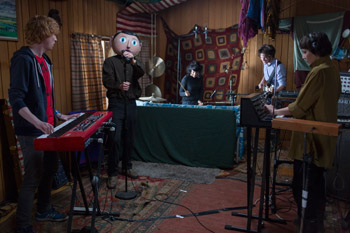 Written by Jon Ronson (The Men Who Stare At Goats) and Peter Straughan (Tinker Tailor Soldier Spy, The Men Who Stare At Goats), Frank is a fictional story loosely inspired by Frank Sidebottom, the persona of cult musician and comedy legend Chris Sievey, as well as other outsider musicians like Daniel Johnston and Captain Beefheart. The idea sprung from a memoir by Jon Ronson, who was himself the keyboard player in Sidebottom's band.
Written by Jon Ronson (The Men Who Stare At Goats) and Peter Straughan (Tinker Tailor Soldier Spy, The Men Who Stare At Goats), Frank is a fictional story loosely inspired by Frank Sidebottom, the persona of cult musician and comedy legend Chris Sievey, as well as other outsider musicians like Daniel Johnston and Captain Beefheart. The idea sprung from a memoir by Jon Ronson, who was himself the keyboard player in Sidebottom's band. Jon Ronson teamed up with his The Men Who Stare At Goats co-writer Peter Straughan and wrote a screenplay about an aspiring musician who gets caught up in the world of an oddball band fronted by an unconventional genius who hides behind an enormous fiberglass head.
The project was brought to Tessa Ross and Katherine Butler at Film4 by producers David Barron and Stevie Lee. They then brought on board director Lenny Abrahamson and his long-time producer Ed Guiney. Abrahamson worked closely with Jon Ronson and Peter Straughan, developing and honing the script.
Lenny Abrahamson has a track record in films about oddball characters who have the uncanny ability to engage audiences, so it was no surprise that he would be drawn to the character of Frank. But he was also very taken by the Jon character, through whose eyes the story is told.
'We laugh at Jon Ronson because he clings to an idea of himself which is so ridiculously at odds with the person we see in front of us," says Lenny Abrahamson. 'But we also recognise ourselves in him; wanting to have, maybe kidding ourselves we really do have, capacities and talents we deep down know we lack. Most of us are smart enough to avoid situations where we might have to put our fantasies to the test, but the film takes Jon on a journey where he has to do just that."
'It's a hard film to categorise," continues the director. 'It's very playful in tone and has some sequences of out and out, broad slapstick. But it has subtle, darker, more moving aspects as well. Frank is both a real, complex person and a kind of cartoon character. The head, with its fixed expression becomes a sort of blank canvas on which Jon Ronson can project his clichéd ideas of what creativity is all about. Jon Ronson, himself starts as the butt of the joke but evolves into something much more than that. So tonally the film is pretty rich – funny, tender, broad in parts, quiet and moving in others."
Producer Ed Guiney concurs: 'One of the things that is really striking about the film is the way it seamlessly combines various different types of comedy. Lenny Abrahamson has a great facility for using humour to get to the core of the characters, and can do so in a wonderfully entertaining and often very affecting way. You can see his love of pure, old-fashioned slapstick in some of the scenes, which hark back to old-fashioned comedies. The film also has some wonderful, delicate character comedy as well as being very poignant and emotionally resonant."
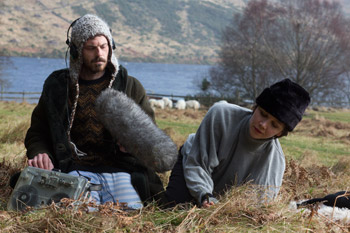 'Frank is someone who wants to hide away from the world," continues Ed Guiney, 'and the film is about how he moves away from his trusted allies and collaborators and takes a step onto a bigger stage, and what happens when he does that. The head is a barrier but it's also a comfort and protection to him."
'Frank is someone who wants to hide away from the world," continues Ed Guiney, 'and the film is about how he moves away from his trusted allies and collaborators and takes a step onto a bigger stage, and what happens when he does that. The head is a barrier but it's also a comfort and protection to him." After reluctantly accepting that there may be limits to his natural creativity, Jon Ronson appoints himself the band's Svengali, hoping to give them the recognition he thinks they deserve. Jon Ronson initially believes either Clara, or else the band's chaotic disorganisation is holding the them back, but he discovers that there are other, more poignant reasons for their inability to achieve mainstream exposure.
'Jon Ronson disturbs the band's perfect equilibrium," explains Ed Guiney. 'He's got more worldly ambitions - he wants to be a rock star. That desire rubs up against a group of artists who are happy making music for its own sake, so there are two opposing creative drives."
Although the central character of Frank owes much to Chris Sievey's alter ego, the fact that Jon Ronson and Peter Straughan opted out of the standard biopic and instead took a big imaginative leap made the story a more appealing prospect to Lenny Abrahamson.
'This freed us up to imagine our own Frank who draws on aspects of some of the great outsider musicians – Beefheart, Daniel Johnston, Harry Partch – while at the same time staying true to Chris Sievey's freewheeling creative spirit. The Frank of the film is an American musician, genuinely gifted, who for his own deep reasons, can't live outside this disguise, this mask," explains Lenny Abrahamson.
The fact that Frank remains very hard to pin down is part of the fun of the film, according to Lenny Abrahamson. 'You have this shifting, hard to determine central presence. A lot of Jon Ronson's time is spent wanting to penetrate the mask and to find the source of Frank's musicality and to find out who the guy is. The audience is in the same position. Frank is mercurial and has massive mood swings; he can be genuinely crazy and at other times quite sweet.
Naturally enough, given the big fake head, we started to think about actors with a strong physical presence, and Michael Fassbender was top of the list. We were excited not just by Michael Fassbender's powerful physicality as an actor but also by the prospect of taking a face that everyone wants to photograph and hiding it. It's a testament to Michael Fassbender's spirit of adventure as an actor that it appealed to him to do it and in the end he delivered a performance so nuanced and funny and physically impressive."
When speaking to what first drew him to the film, Michael Fassbender cited the writing: 'It was the script," he says. 'It was so funny, I was laughing out loud. I didn't know where it was going to go from scene to scene, it had me intrigued. It was a very original piece with moments of real poignancy within the comedy. It's my kind of humour, it's silly and fun with physical comedy and I really wanted to do a comedy and this fit the bill." He also had great admiration for Lenny Abrahamson. 'I loved Garage and What Richard Did," says the actor. 'There's a real sensitivity to the work. Lenny Abrahamson's very precise, he does his homework and he knows how he wants to shoot, but he's very open to ideas so we kept the looseness and put new things in on the day."
The actor describes Frank as a 'very pure person and quite fragile because of it. He doesn't have the skillset to negotiate people and society, he suffers from anxiety and a mental illness but he's a wonderful musician and that's how he expresses himself. He's a kind of weird James Brown, he's the creative spark and various members of the group baby-sit him as he's quite childlike. He and Clara, played by Maggie Gyllenhaal, are quite co-dependent - she's his nurse and he becomes a patient."
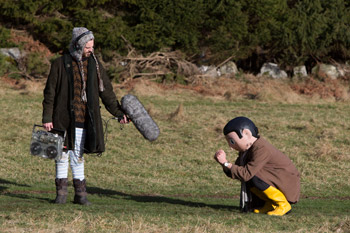 That relationship is given a jolt with the arrival of Jon Ronson, says Michael Fassbender. 'Jon Ronson finds Frank really intriguing and mysterious and in a way so free. Jon Ronson is so lost in trying to find who he is as a musician and he sees an experimental and free performer in Frank and he looks up to him. In a way Jon Ronson wants to own Frank and that becomes a battle with Clara."
That relationship is given a jolt with the arrival of Jon Ronson, says Michael Fassbender. 'Jon Ronson finds Frank really intriguing and mysterious and in a way so free. Jon Ronson is so lost in trying to find who he is as a musician and he sees an experimental and free performer in Frank and he looks up to him. In a way Jon Ronson wants to own Frank and that becomes a battle with Clara." Playing Jon Ronson is rising Irish star Domhnall Gleeson, who was attracted by the chance to flex his acting muscles on a character that transforms over the course of the story. 'Jon Ronson is not necessarily ambitious, but he becomes ambitious and becomes willing to crawl over people and does some terrible things to get what he wants because he wants to be famous. He suddenly realises that he could be cool, so he goes for it."
'When Jon Ronson joins the band, he's ineffectual and polite and very English which is completely at odds with the rest of the band who argue and bitch and fight with each other, but are still a very cohesive unit which produces really good music. He brings in this different dynamic and he sets off a chain of events which is really unhealthy for the band."
Already a fan of Jon Ronson, Domhnall Gleeson found the screenplay laugh-out-loud funny. 'I thought it was really hilarious,' he says. 'The dialogue was really well constructed, but what really made me laugh was the physical humour which was not only funny to read, but much funnier to imagine, and I really wanted to take on that side and see how funny we could make it. I also loved working with all the actors as everyone had a different way of working and a different vibe. I enjoyed not knowing what would happen on a daily basis!"
Working with Lenny Abrahamson also brought unique rewards. 'I worked really closely with Lenny on the character before we started filming and I really enjoyed being directed by him," says Domhnall Gleeson 'He's very clever and he brought a lot of heart to the film and that's a really good combination. He's very specific but he's open to suggestion."
Maggie Gyllenhaal plays Jon Ronson's nemesis, Clara. The character of Clara presented the actress with some intriguing challenges. 'When I first read the script I thought Clara was tough and harsh," says Maggie Gyllenhaal. 'People are usually like that because they are unhappy, but her situation is made more difficult because she's trying to make a connection with someone who always wears a plastic head. So she's disappointed and she's leading a sad life, but she's in an amazing group and I think she gets off on playing in this wild band."
'For me, Frank is a film about connections and what it means to connect," continues the actress. 'When you're around someone wearing a giant head it makes you question what it means to connect, how important and how terrifying it is, and about the part making art plays in that. Jon Ronson just wants to play music that a lot of people will relate to and that's not in the band's nature. Clara, in particular, knows how much you have to sacrifice to do that. There's a different kind of connection made by making something that's so specific and particular that maybe only a few people connect to it."
'Clara is Jon Ronson's antagonist,' explains Maggie Gyllenhaal. 'She's fighting Jon Ronson and his desire to get a lot of people to like the music. She thinks, not only is that unimportant but it's dangerous. She has Frank's best interests at heart and she loves him and has based her whole identity around him, but she's often very disappointed, although she doesn't ever let that show. She'd rather die than show vulnerability but it always leaks out, and that's interesting to watch."
Acting alongside a character who is always hidden inside a giant head gave an extra dimension to the concept of connection. 'The only way to do it was to believe that there was nothing unusual about it and that it was his real head," she explains. 'It made it almost impossible to connect with Frank the character because he was literally unreachable in the giant head; it made the character very internal."
Working with Lenny Abrahamson afforded Maggie Gyllenhaal the chance for some genuine creative collaboration. 'So much of the movie is imaginative and the script was very open," says Maggie Gyllenhaal. 'I had to come up with a lot of it myself as Clara doesn't have much dialogue and Lenny Abrahamson was very interested and open to the way I wanted to play her and the stuff I'd come up with during the shoot. It takes someone with real confidence in their own ability as a director to let other people's ideas in."
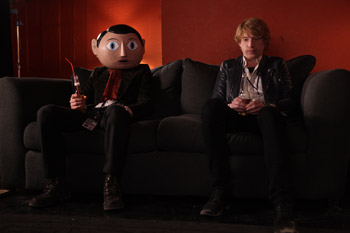 When it came to creating the head that Frank hides behind, the filmmakers had to combine an arresting look with practicality, as Michael Fassbender would be filmed in it for almost the entire shoot. 'We discussed every kind of head that he might wear," remembers Lenny Abrahamson, 'but came back to the round cartoon head which positions the character between real and unreal. It's so interesting that, while the -face' never changes, somehow it seems to take on the emotions held in the scene. This has a lot to do with how Michael Fassbender subtly emphasises his movements so you can tune into what's happening for the character, but it's also just the way film works. Show a warm fuzzy image then cut to a close up of a face and the face seems to express one thing, show something scary or disturbing and cut to the same close up and the face says something very different. '
When it came to creating the head that Frank hides behind, the filmmakers had to combine an arresting look with practicality, as Michael Fassbender would be filmed in it for almost the entire shoot. 'We discussed every kind of head that he might wear," remembers Lenny Abrahamson, 'but came back to the round cartoon head which positions the character between real and unreal. It's so interesting that, while the -face' never changes, somehow it seems to take on the emotions held in the scene. This has a lot to do with how Michael Fassbender subtly emphasises his movements so you can tune into what's happening for the character, but it's also just the way film works. Show a warm fuzzy image then cut to a close up of a face and the face seems to express one thing, show something scary or disturbing and cut to the same close up and the face says something very different. ''The fact that I could wear a fake head through the whole thing had an allure," says Michael Fassbender. 'The head is a bit weird to begin with as you can't see much - it's got a very restrictive vision - but it ended up being great fun! It's liberating and gives you a sense of power. It makes you feel vulnerable but there's a power and strength to it."
'The possibility of mischief in being behind a mask is very great,' laughs the actor. 'I looked at some of the Commedia dell'Arte which I remembered doing at drama school, and it gives you a sense of freedom. I liked the idea that the lead character of a film be behind a mask just the idea of why someone would want to be behind a mask for 15 years is interesting. It also meant I didn't have to turn up for work until 5 minutes before filming – no hair and make-up, stick the head on and stroll into work!" Joking aside, the head meant that Michael Fassbender had to rethink his approach to acting. 'There are no facial expressions so I found small movements more effective,' he explains. 'His movements are restricted, he's quite retiring and socially inept but when he performs his alter-ego comes out and he becomes dangerous and confident. I liked playing with the masculine and feminine sides of his character in different scenes. But for the most part there's a strangeness in his skin and we played around with that."
Michael Fassbender soon inhabited the head so completely that it became a part of the actor. Says Domhall Gleeson: 'In some scenes it was just like being opposite Michael Fassbender not wearing a giant head but in others, you didn't know what he was thinking and that was important. It was a very weird experience, but brilliant and really funny. For all we know he could have just been rolling his eyes under the head during every take!"
Of course, what makes Frank so unique is the integral part that music plays in the film - it's almost another character. Lenny Abrahamson and his collaborators spent a long time deliberating over the kind of music they wanted to create. It was partly to situate the band, whose name -The Soronprfbs' is deliberately unpronounceable, thus making for a wry running gag, within a very particular musical space that is neither too avant-garde nor too mainstream.
'You have to feel that the band are outside the mainstream,' says Lenny Abrahamson, 'but there has to be something about them that draws Jon and the audience to them so they can't be uber experimental. We tried to create music that was eclectic and constantly changing; it's melodic but it doesn't have a beginning and a middle - it just goes off so you keep hearing things that make you think if they just toned it down it could work really well. It's strange but accessible. You can't say what genre they are; they are an experimental pop band."
Michael Fassbender, Maggie Gyllenhaal and Domhall Gleeson are joined by American musician Carla Azar (drummer with Jack White's band and drummer/singer for Autolux) on drums, and French actor/musician Francois Civil on bass. 'Carla Azar is a superb musician and although she hadn't acted before she's an amazing physical and psychological presence, and anchored the band; and Francois is a great actor and also an amazing musician, so he was a no brainer," says Lenny Abrahamson. 'Their presence means that the rhythm section of the band is exceptional and that allowed the other actors, who are all very musical, to slot into something quite solid; the life that's in the music and the ability to record the band live was down to them."
All the band's music we hear in the film was recorded live. It was a bold and risky strategy but essential to preserve the film-s integrity. 'Recording the music live was important so the audience believe they are watching and hearing a real band," explains Lenny Abrahamson. 'If you are doing it live you can also integrate the music and drama. To me this was vital – if we were tied to playback then there would be no freedom to improvise and play on the day. We had a mobile recording studio and Stephen worked with us on set so we could be flexible and change things. It was hard but they turned out to be a really good band!"
'We could never take films seriously when the actors weren't really playing the music so we always said that this band is going to really have to play," says Stephen Rennicks. 'It had a huge effect on casting but Lenny Abrahamson is rigorous in trying to get to the truth in this world that he's revealing, and the music is a huge part of that."
'The tracks we composed all had to feel real, as if the band had created them," continues the composer. 'They also had to be weird and not commercial; they had to have something beautiful, but it had to be a bit inaccessible. So the music is melodic and harmonic, but just kind of wrong - almost childlike, a weird mash up of stuff. The band in the film are all co-dependent. This was a little travelling family who happened to be a band, but it was never about being successful."
Lenny Abrahamson and Stephen Rennicks were both pleasantly surprised by their cast's musical abilities. Both Domhnall Gleeson and Maggie Gyllenhaal proved to be accomplished singers while Michael Fassbender was so keen that he had to be cajoled into not singing as much as he wanted. 'When they came together there was a real chemistry in the room," recalls Stephen Rennicks.
A short rehearsal period before filming began allowed the actors to become comfortable playing with each other. Says Ed Guiney 'By the time we started filming it feel like the band really existed."
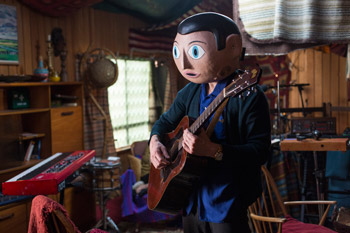 Real-life musician Carla Azar playing drummer Nana found the band came together organically during the rehearsals. 'I was worried it would feel awkward and forced but this particular group came together and it feels completely natural; that's Lenny's doing as he brought everyone together. We became a band during the music rehearsals. It feels as natural as my own band."
Real-life musician Carla Azar playing drummer Nana found the band came together organically during the rehearsals. 'I was worried it would feel awkward and forced but this particular group came together and it feels completely natural; that's Lenny's doing as he brought everyone together. We became a band during the music rehearsals. It feels as natural as my own band." Carla Azar was also impressed with her band mates' talents. 'Francois is an incredible musician," she enthuses 'and Michael Frassebender is just oozing with charisma no matter what he does, and for someone who fronts a band that is the main quality, and Maggie Gyllenhaal is great - it didn't feel phony for me at all."
All the actors were also enthusiastic about the music they played; 'The music is really entertaining, but it's always odd," says Domhnall Gleeson. 'Stephen Rennicks has done a really great job with it. It's always joyous and melodic but strange. We did two weeks rehearsal to have time to feel we were in a band and the first time we were all on stage together it was brilliant and felt odd and dangerous and I really enjoyed it. The keyboard is quite difficult and you have to just go with it, you can't stop and say I've got something wrong. I learned it to a level that I can play the songs from the film but nothing else. Everything came from Steve, it's his music and he created a structure; we were allowed to play within that. For Jon Ronson's terrible songs I suggested I write them - then they would be bad, as I'm terrible at music so we did that and I would write something and Stephen Rennicks would say…-That's too awful.'"
'I really like their music, which is down to Stephen Rennicks and Lenny Abrahamson, who has been writing a lot of the lyrics," says Michael Fassbender. 'They've created some off beat and quirky sounds with some moments of beauty and real honesty. We're hoping to go on the road! We were joking it would be fun to play a few gigs!"
Carla Azar adds 'I was really surprised - the music was really good. Stephen gave us the music template and then said play what you want, but I never wanted to change anything as it was so great."
Maggie Gyllenhaal learned to play the synthesiser and theremin for her role. 'It doesn't come naturally to me at all. The theremin is really hard to play - it's really like playing air and you're changing pitch with your right hand and volume with your left but there's no point of reference; you literally are just playing the air. I got really interested in it. Some of the sounds I got out of it were really beautiful but it was mostly luck. I could see myself continuing to play that. I loved the instruments Clara Azar plays, they are so awesome."
Frank
Release Date: June 19th, 2014
Have You Seen This?
MORE


